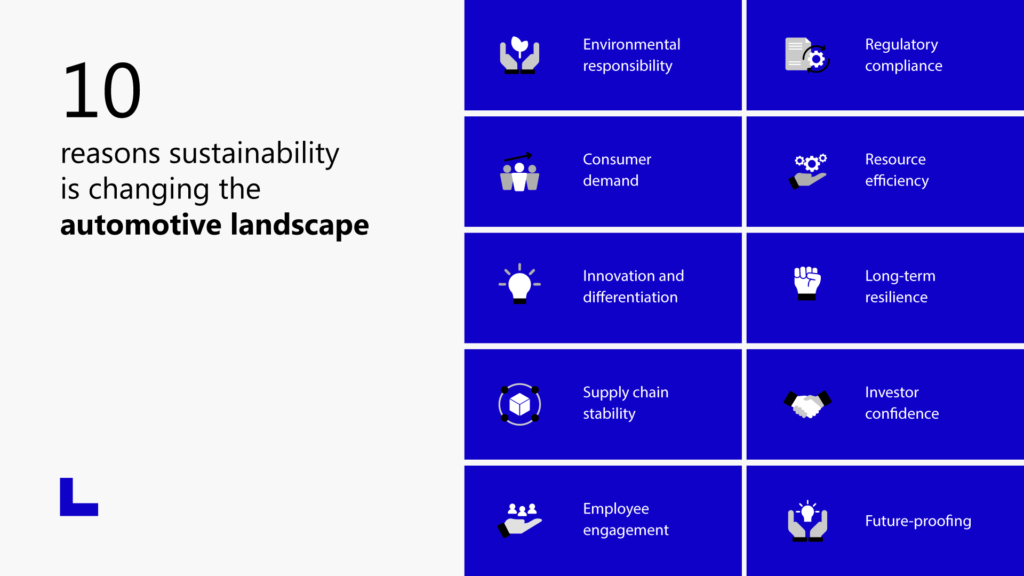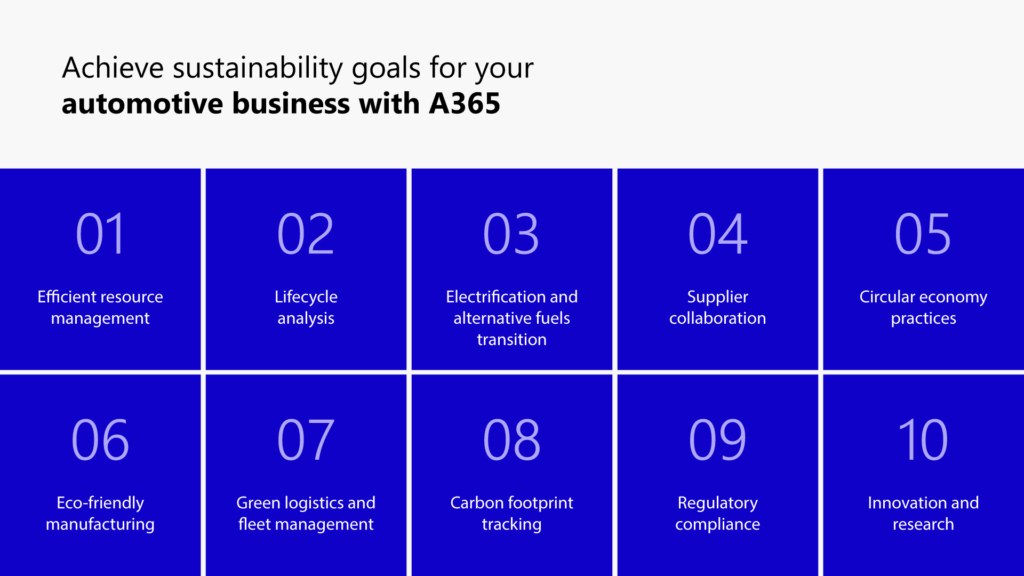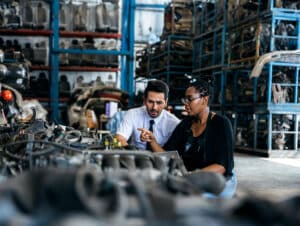The automotive landscape is at a crossroads, where sustainability is no longer a mere option but an imperative. Environmental concerns, shifting consumer preferences, regulatory mandates, and the need for resource conservation are driving the industry’s transformation towards more sustainable practices.
One report estimated that the 86 million cars that were sold in just one year (2018) accounted for 9% of global greenhouse gas emissions.
Businesses that proactively integrate sustainability into their operations are better poised to navigate the challenges of the future, satisfy consumer demands, meet regulatory requirements, and contribute to a healthier planet.
10 reasons sustainability is changing the automotive landscape

Environmental responsibility: The automotive industry is a significant contributor to global carbon emissions, air pollution, and resource depletion. Embracing sustainability is vital to mitigate these impacts and preserve the planet. By reducing carbon emissions, improving fuel efficiency, and adopting cleaner manufacturing processes, automotive businesses can play a pivotal role in addressing climate change and environmental degradation.
Regulatory compliance: Governments worldwide are enacting stricter environmental regulations to curb pollution and promote sustainability. Non-compliance can result in hefty fines, legal challenges, and reputational damage. Embracing sustainable practices ensures that automotive businesses stay ahead of regulatory changes and demonstrate a commitment to responsible operations.
Consumer demand: Modern consumers are increasingly conscious of the environmental impact of their purchases. They seek eco-friendly alternatives and are more likely to support businesses that prioritize sustainability. Automotive businesses that offer electric vehicles, hybrids, and other fuel-efficient options are well-positioned to capture this growing market segment and build brand loyalty.
Resource efficiency: Sustainable manufacturing processes optimize resource usage. Efficient energy management, waste reduction, and recycling initiatives not only minimize the industry’s ecological footprint but also lead to cost savings. Energy-efficient production methods, such as lean manufacturing and recycling materials, contribute to improved operational efficiency and reduced expenses.
Innovation and differentiation: Pursuing sustainability often spurs innovation. Businesses that invest in research and development of greener technologies, such as electric or hydrogen fuel cell vehicles, stand out as pioneers in a competitive market. Such innovation can lead to differentiation, attracting environmentally conscious customers and enhancing market share.
Long-term resilience: As global concerns about resource scarcity and energy availability increase, automotive businesses need to prepare for the long term. Sustainable practices, such as reducing reliance on fossil fuels and optimizing energy consumption, ensure resilience in the face of potential resource constraints and market volatility.
Supply chain stability: Sustainable practices extend beyond a company’s operations to its supply chain. Businesses are increasingly evaluating the environmental impact of their suppliers and demanding sustainable practices throughout the value chain. This not only ensures ethical sourcing but also enhances supply chain resilience against disruptions caused by climate-related events.
Investor confidence: Investors are recognizing the financial risks associated with environmental and social issues. Companies that prioritize sustainability are more likely to attract socially responsible investors who seek to align their investments with their values. Demonstrating a commitment to sustainability enhances investor trust and can lead to increased financial support.
Employee engagement: Employees are drawn to companies that demonstrate a commitment to social and environmental responsibility. A workplace that values sustainability fosters a sense of purpose among employees, leading to increased engagement, productivity, and job satisfaction. Businesses that promote sustainability can attract and retain top talent.
Future-proofing: The automotive industry is undergoing a transformative shift with the rise of electric vehicles, autonomous driving, and mobility-as-a-service. Embracing sustainability positions automotive businesses to adapt and thrive in this changing landscape. Companies that proactively invest in sustainable technologies and practices are better equipped to remain relevant and competitive as the industry evolves.
Achieve sustainability goals with A365
A365, built on Annata’s vast industry expertise on top of the foundation of Microsoft Dynamics 365 and other technologies within the Microsoft ecosystem, offers a comprehensive solution that empowers automotive businesses to enact sustainable practices.
By seamlessly integrating data-driven insights, AI, and analytics, A365 enables these businesses to optimize cleaner business practices and drive innovation aligned with environmentally friendly goals. This robust platform not only aids in reducing environmental impact but also positions automotive businesses as frontrunners in sustainable practices within the industry.

Efficient resource management: A365’s advanced analytics and data-driven insights enable automotive businesses to optimize their resource usage. By analyzing production processes, supply chain operations, and energy consumption patterns, businesses can identify areas of inefficiency and implement strategies to minimize waste, conserve resources, and reduce environmental impact.
Lifecycle analysis: A365 empowers automotive businesses to conduct comprehensive lifecycle assessments of their vehicles. This involves evaluating the environmental impact of materials, production processes, operational phase, and end-of-life considerations. By gaining insights into the entire product lifecycle, businesses can make informed decisions to design, manufacture, and manage vehicles in a more sustainable manner.
Electrification and alternative fuels transition: A365 supports automotive businesses in the transition to electric and hybrid vehicles. The platform offers tools for managing electric vehicle fleets, monitoring charging infrastructure, and ensuring optimal battery health. This aids in reducing greenhouse gas emissions and promoting the adoption of cleaner transportation alternatives, thereby contributing to a greener future.
Supplier collaboration: A365 fosters collaboration between automotive businesses and their suppliers to promote sustainability throughout the supply chain. The platform facilitates communication, transparency, and compliance tracking, ensuring that suppliers adhere to environmental standards and ethical practices. This results in responsible sourcing and the reduction of negative environmental impacts from raw material extraction to component manufacturing.
Circular economy practices: A365 supports circular economy principles by managing the lifecycle of vehicle components. Automotive businesses can track the recycling, refurbishing, and repurposing of parts, reducing waste and conserving valuable resources. By embracing circular economy practices, businesses contribute to a more sustainable and resource-efficient industry.
Eco-friendly manufacturing: Through data analytics and process optimization, A365 assists automotive businesses in adopting eco-friendly manufacturing practices. By analyzing production data, energy consumption, and waste generation, businesses can identify opportunities for improvement. This might include energy-efficient technologies, lean manufacturing principles, and reduced emissions, resulting in a greener production process.
Green logistics and fleet management: A365 optimizes logistics and fleet management for reduced environmental impact. Businesses can use the platform to optimize transportation routes, monitor vehicle performance, and schedule maintenance effectively. This minimizes fuel consumption, lowers emissions, and enhances operational efficiency, contributing to sustainable transportation practices.
Carbon footprint tracking: A365’s robust data analytics capabilities allow automotive businesses to track and measure their carbon footprint throughout the value chain. This comprehensive tracking supports accurate reporting, progress assessment, and transparency in sustainability efforts. By quantifying their carbon emissions, businesses can set targets, implement strategies for reduction, and report their environmental progress to stakeholders.
Regulatory compliance: A365 ensures automotive businesses remain compliant with evolving environmental regulations. The platform automates compliance processes, tracks regulatory changes, and generates alerts for businesses to take appropriate actions. Staying compliant not only avoids penalties but also demonstrates the business’s commitment to responsible operations.
Innovation and research: A365’s integration with advanced technologies, such as artificial intelligence and data analytics, drives innovation in sustainability. By harnessing insights from data, businesses can develop new technologies, materials, and products that align with environmentally friendly goals. This promotes a culture of continuous improvement and positions automotive businesses as leaders in sustainable innovation.
Dive deeper into how our cutting-edge solution, powered by advanced analytics and insights, can revolutionize your business’s approach to sustainability. Download our comprehensive factsheet today and explore how A365 Analytics can drive efficiency, innovation, and eco-friendly practices across every facet of your automotive operations.









